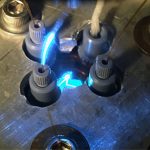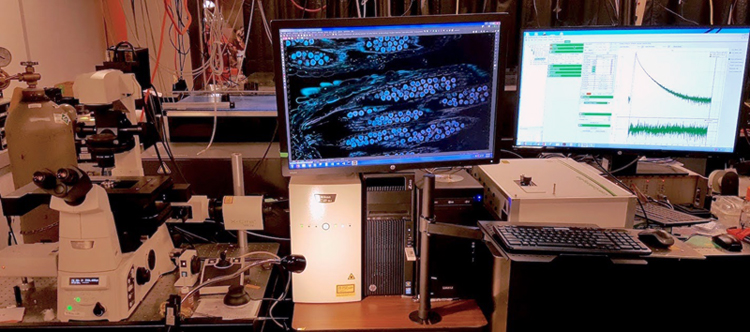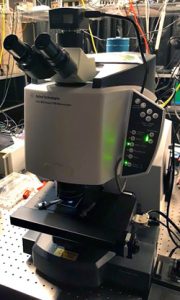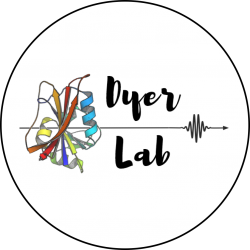Current Capabilities
- Fluorescence Imaging
- Spinning Disk Confocal Fluorescence Microscope (Olympus)
- Confocal Laser Scanning Microscope (Nikon ECLIPSE Ti-E inverted microscope; Nikon C2+ laser scanning system)
- Time Resolved Fluorescence Spectroscopy (PicoQuant TCSPC)
- Fluorescence Lifetime Imaging
- Fluorescence Correlation Spectroscopy
- Förster Resonance Energy Transfer
- FTIR Microscopy (Agilent Cary610)
 While enzyme dynamics and protein folding can be probed with conventional spectroscopic methods, fluorescence imaging is a very powerful tool to expand on our labs capabilities to study the processes that can’t be accessed through traditional spectroscopy. For instance, our spinning-disc confocal fluorescence microscope is coupled to microfluidic mixer where fast processes such as enzyme turnover can be followed in a sub-millisecond timescale.
While enzyme dynamics and protein folding can be probed with conventional spectroscopic methods, fluorescence imaging is a very powerful tool to expand on our labs capabilities to study the processes that can’t be accessed through traditional spectroscopy. For instance, our spinning-disc confocal fluorescence microscope is coupled to microfluidic mixer where fast processes such as enzyme turnover can be followed in a sub-millisecond timescale.

The confocal laser-scanning microscope provides supreme spatial resolution down to the diffraction limit, and allows for 3-D time-lapse imaging. As an upgrade to the confocal microscope, we carry a time- correlated single photon counter (TCSPC) unit, in conjunction with 4-pulsed lasers across the visible range (405nm, 485nm, 520nm, 640nm). The TCSPC upgrade allows us to perform quantitative fluorescence imaging and lifetime measurements from 100ps up to second timescale. FLIM, FCS, and FRET can be performed to study protein conformational changes (such as M2 proton channel), protein-protein interactions on supported lipid bilayer, or fast dynamic events related to fluorescence lifetime such as hole filling with sacrificial electron donor in quantum dots, etc.

Unlike typical optical microscope equipped with glass optics that absorb large portion of light in the IR region, FTIR microscope features all-reflective optics, which ensure coverage of the entire IR spectra (~50-10000cm-1). The IR scope features a visible CCD camera, along with a focal plane-array detector that allows for Infrared chemical imaging. It also boasts of a single element mercury cadmium telluride (MCT) detector, that allows for operation in non-imaging mode. The microscope is capable of micrometer scale spatial resolution that allows precision mapping of materials.

